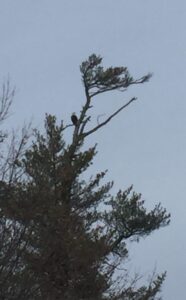 Just 10 feet ahead of us, it swooped over the road, rising gently from the field on our right. The eagle landed just above our heads in a tall scraggly pine to our left. Tall, majestic, certain of its perch. She watched us watching her — or maybe we were watching her watching us. Her white head and dark body contrasted with the bright blue sky all around so we were able to notice the loft of her feathers, the strength of her features, the tail that seemed shorter from the front than it does in flight. I am sorry you can’t see the face in this picture; I was particularly drawn to the vibrant yellow beak and the clear, straight gaze, inviting us to be with her.
Just 10 feet ahead of us, it swooped over the road, rising gently from the field on our right. The eagle landed just above our heads in a tall scraggly pine to our left. Tall, majestic, certain of its perch. She watched us watching her — or maybe we were watching her watching us. Her white head and dark body contrasted with the bright blue sky all around so we were able to notice the loft of her feathers, the strength of her features, the tail that seemed shorter from the front than it does in flight. I am sorry you can’t see the face in this picture; I was particularly drawn to the vibrant yellow beak and the clear, straight gaze, inviting us to be with her.
When we finally began to detach ourselves, we waved good-bye and continued down the road. I paused to take a picture and, in doing so, dropped my mitten. The big bird took off, startled by the movement or sound, or maybe simply preferring not to have her picture taken.
The next day, while running the same route, I saw her again. At least, I think it was her. Again, she flew low over a field and just past me, like she was intentionally revealing herself to me. Her presence feels like a reminder to keep my eyes open to gifts and surprises – not because there are so few but because they are always here if only I would pay attention enough to notice them.
Twenty years ago, we lived in the Chilkat River Valley, the valley of the eagles. Bald eagles lived in the valley year round but, each fall and winter during the salmon runs, they were ubiquitous and bountiful. Though common, we never failed to notice the majestic presence of the individual birds and the power in their massive congregation. We knew how lucky we were to live in their presence. The landscape belonged to the eagles and the salmon, the mountains and the rivers. We were grateful and humble visitors to their home.
By contrast, greeting the single eagle on the road two days in a row, I felt like a host. I wonder (and worry) if she is finding enough food and if there is an adequate nesting spot here. In this neighborhood dotted by patches of forest, field and marsh, is there enough space? In this forest interrupted by farm fields and houses and barns and cows, is there enough wilderness? Is she one of the three eagles we spotted feeding on a deer carcass that was thawing out of the snow and ice at the marsh edge a week ago? Is she a winter visitor or a resident? When can I see her again?
As my question, concerns, and longing turn over and over in my head, I sense that something is out of balance. There is too much of me, too much of my expectations and assumptions, of my care and concern. In the lopsided encounter, there is not enough of us and that sacred, open space between us where we meet as autonomous beings – each with something beautiful and tangible to give the other, the greatest gift we have to offer – our presence.
If I become too attached to the role of guest or host, I miss the ability to be fully present. Currently, I fancy myself to be a host in my home and in my community but feel like I am clearly a guest in the wider world. My cultural training nudges me to embrace the role of host more fully. As host, I can prove competence and self-reliance, independence and generosity. These are the assets that are rewarded both subtly and overtly in the world around us. As a guest, I get to practice humility and vulnerability, interdependence and graciousness.
When I recognize that I am always both guest and host, I open to the complexity of being human – fallible, invincible, capable, fumbling, awkward, graceful…Honoring my own complexity, and that of the world around me, is ever-present in my work as a program director at a small interfaith seminary, as a parent, as a wife, as a member of a small, rural community, and as a cohabitant of a diverse ecological landscape. Maintaining balance is a little like standing on a balance board. There is constant motion – a continual giving and receiving of energy, tension, intention, intelligence, and care. Attending to the balance and the reciprocity supports each member of the community in retaining their autonomy and integrity while acknowledging that none are truly separate from the whole.
Recently, I have been feeling challenged to release the expectations and hopes I have for myself and for the people around me — especially those that I hold for my children. Now I am reminded to meet their unflinching gaze and broad wings in the same way that I meet the eagle, with a simple presence that honors theirs. Where will the gifts, the surprise reminders of our interconnectedness, come from next?
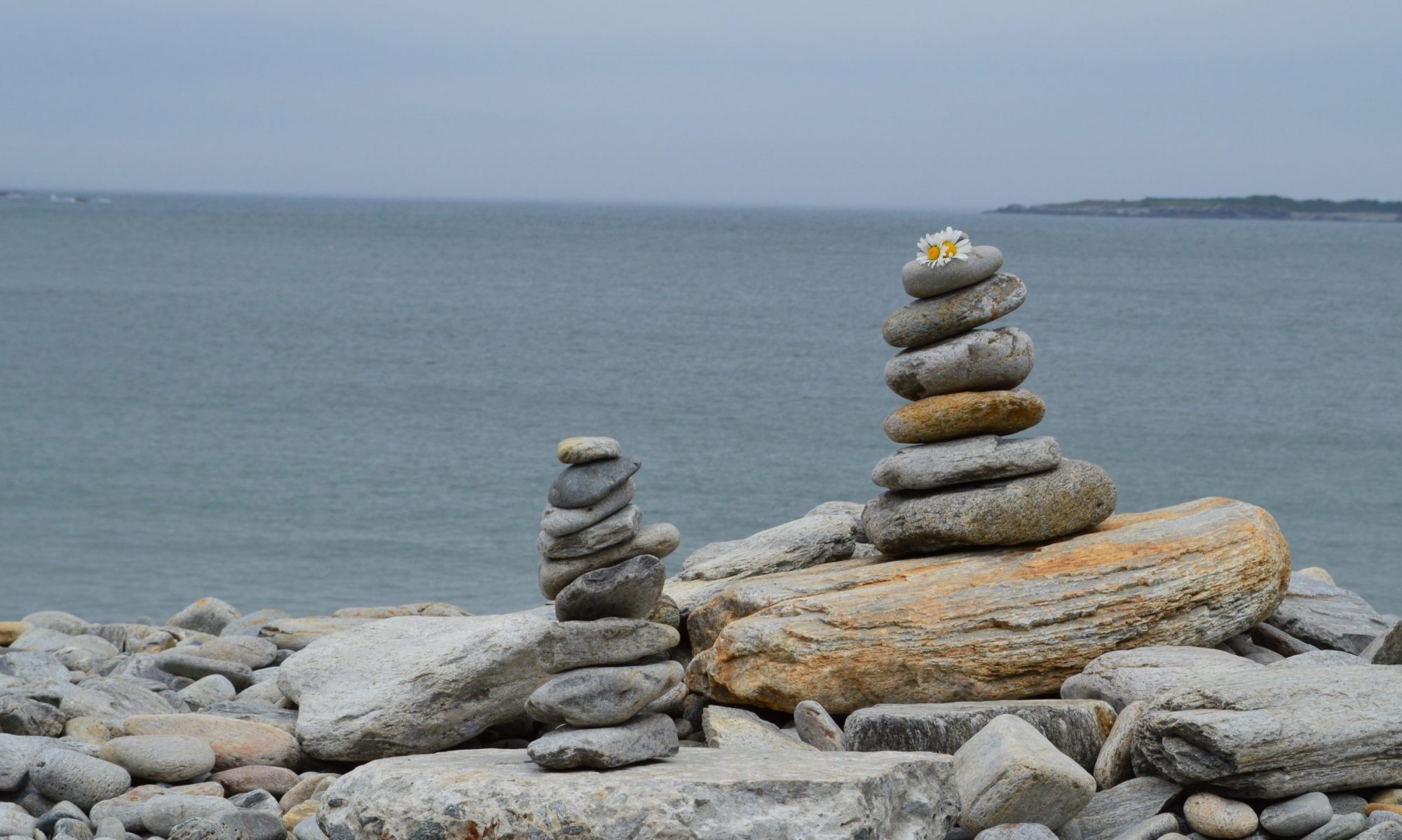

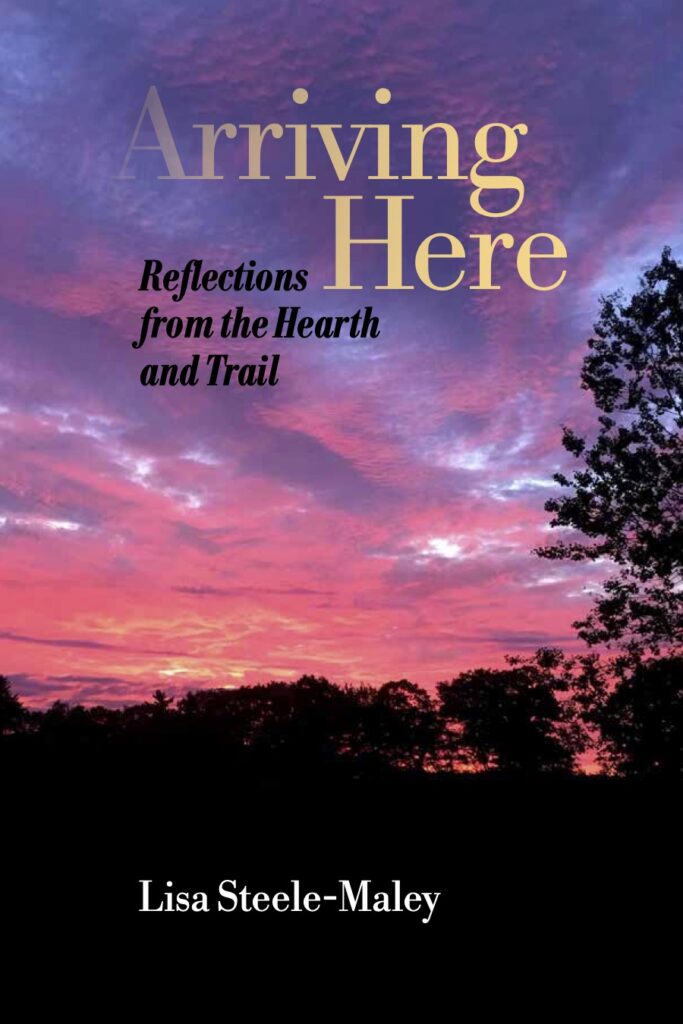
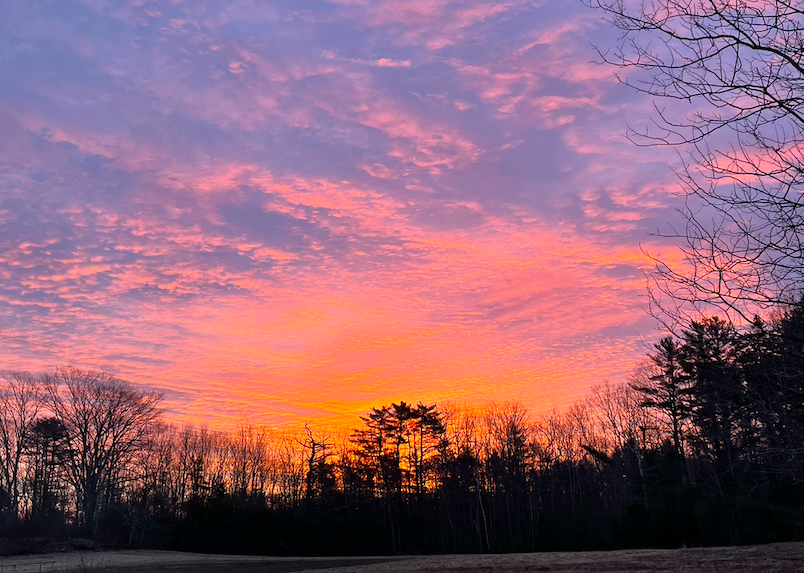
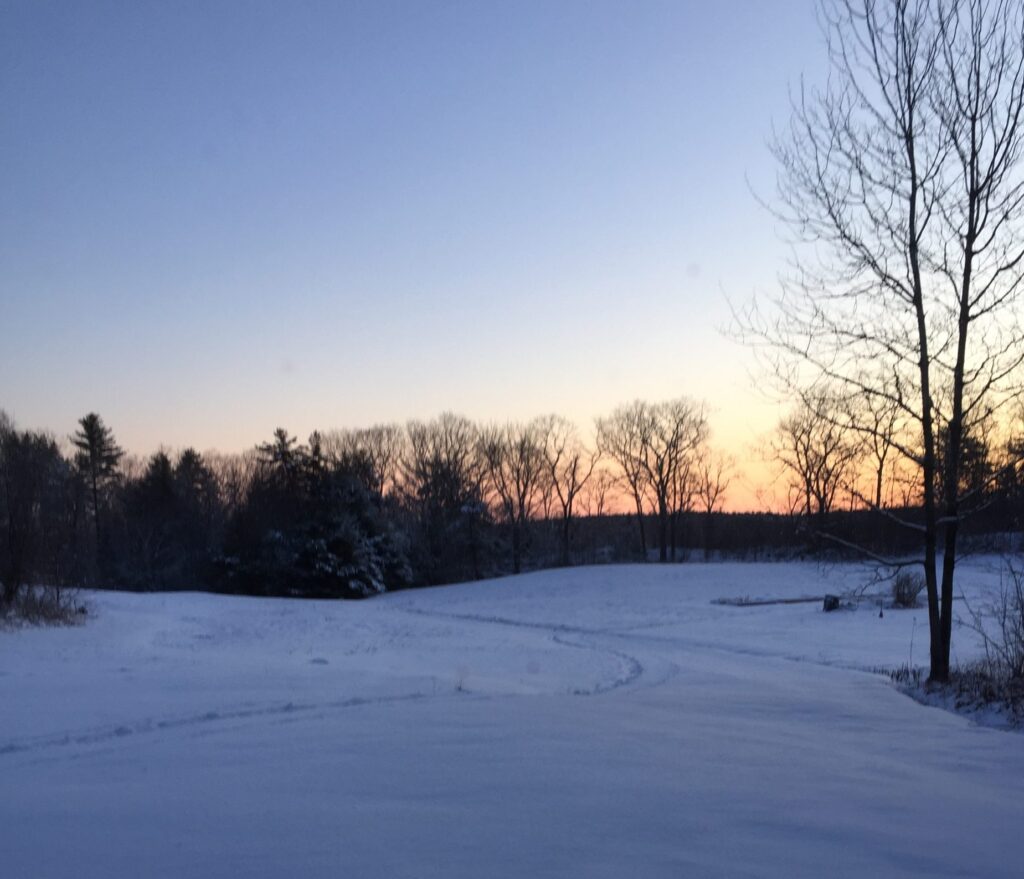
 Just 10 feet ahead of us, it swooped over the road, rising gently from the field on our right. The eagle landed just above our heads in a tall scraggly pine to our left. Tall, majestic, certain of its perch. She watched us watching her — or maybe we were watching her watching us. Her white head and dark body contrasted with the bright blue sky all around so we were able to notice the loft of her feathers, the strength of her features, the tail that seemed shorter from the front than it does in flight. I am sorry you can’t see the face in this picture; I was particularly drawn to the vibrant yellow beak and the clear, straight gaze, inviting us to be with her.
Just 10 feet ahead of us, it swooped over the road, rising gently from the field on our right. The eagle landed just above our heads in a tall scraggly pine to our left. Tall, majestic, certain of its perch. She watched us watching her — or maybe we were watching her watching us. Her white head and dark body contrasted with the bright blue sky all around so we were able to notice the loft of her feathers, the strength of her features, the tail that seemed shorter from the front than it does in flight. I am sorry you can’t see the face in this picture; I was particularly drawn to the vibrant yellow beak and the clear, straight gaze, inviting us to be with her.